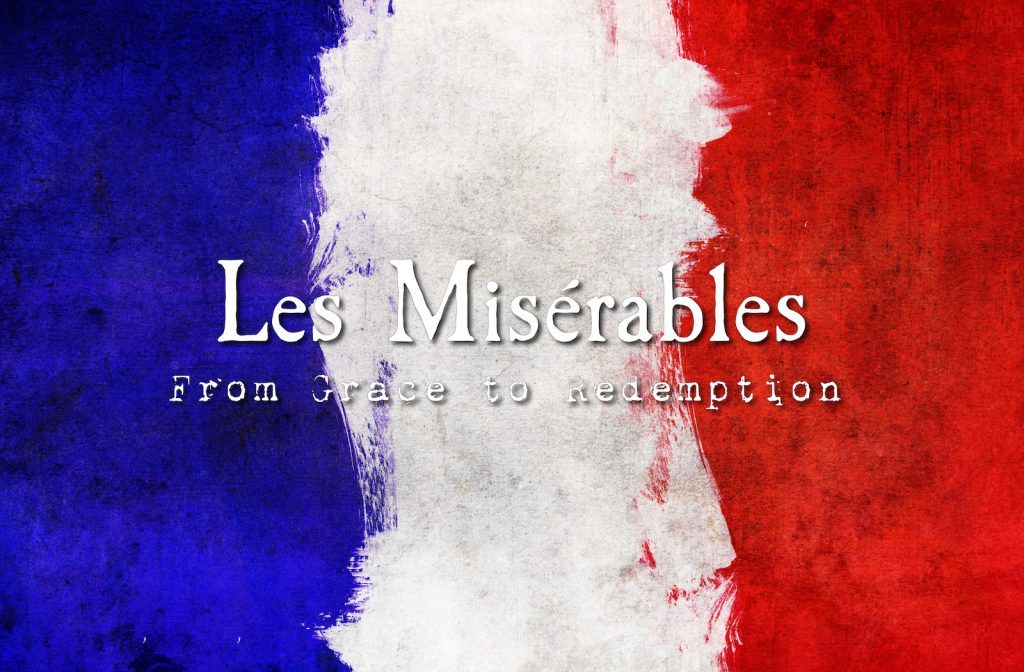This Sunday we begin our series based on the world-famous musical Les Misérables!

We begin with a look at the cultural despair among the people of 19th-century France alongside the despair of Jesus’ disciples after the crucifixion. The musical highlights this sense of despair in the opening song as prisoners experience hard labor, and even when released have limited opportunity. Workers in a factory experience despair as they face hard work, low wages, gender discrimination, and fierce competition among workers. Sunday morning will feature the song “At the End of the Day” by our amazing choir, The Voices of Praise.
In our scripture text for Sunday, the disciples are likely in shock after the events of the previous days. They hide in fear (clearly they didn’t hear my Easter sermon), and I imagine them wondering when they too will meet their end.
John 20:19-31 (CEB)
Jesus appears to the disciples
19It was still the first day of the week. That evening, while the disciples were behind closed doors because they were afraid of the Jewish authorities, Jesus came and stood among them. He said, “Peace be with you.” 20After he said this, he showed them his hands and his side. When the disciples saw the Lord, they were filled with joy. 21Jesus said to them again, “Peace be with you. As the Father sent me, so I am sending you.” 22Then he breathed on them and said, “Receive the Holy Spirit. 23If you forgive anyone’s sins, they are forgiven; if you don’t forgive them, they aren’t forgiven.”Jesus appears to Thomas and the disciples
24Thomas, the one called Didymus, one of the Twelve, wasn’t with the disciples when Jesus came. 25The other disciples told him, “We’ve seen the Lord!”But he replied, “Unless I see the nail marks in his hands, put my finger in the wounds left by the nails, and put my hand into his side, I won’t believe.”
26After eight days his disciples were again in a house and Thomas was with them. Even though the doors were locked, Jesus entered and stood among them. He said, “Peace be with you.” 27Then he said to Thomas, “Put your finger here. Look at my hands. Put your hand into my side. No more disbelief. Believe!”
28Thomas responded to Jesus, “My Lord and my God!”
29Jesus replied, “Do you believe because you see me? Happy are those who don’t see and yet believe.”
30Then Jesus did many other miraculous signs in his disciples’ presence, signs that aren’t recorded in this scroll. 31But these things are written so that you will believe that Jesus is the Christ, God’s Son, and that believing, you will have life in his name.
Consider these questions:
- Have you ever experienced despair? In what way or circumstance?
- What does despair feel like to you? How does it affect you physically and spiritually and emotionally? How does it shape your view of your life and of the world? Or does it do any of those things?
- How do you escape despair? And when you do, how does the escape affect you physically and spiritually and emotionally?
Post-Sermon Update on 4/10
Audio from the sermon can be heard below, and video can be found at this link (will open in a new tab).
Sunday’s message may have seemed unexpectedly dark. And the way our Bibles tell it, the immediate aftermath of Jesus’ death – even beyond the resurrection – were dark and difficult. Together, we explored the ways that despair and desperation (words whose roots are connected) can overcome us.
But Jesus still comes to us. Jesus still breathes into us and gives us life. Jesus still offers us hope! Comfort and peace are possible in us and for us.
Consider these questions:
- Highlighted in the sermon is the section about Thomas. How have you thought about Thomas and has that changed over time?
- How have your emotional and spiritual responses to crisis and/or despair changed over time?
- Have you felt God’s Spirit drawing you out of despair? How has that felt?

2 Comments
Bob Rhodes Author
I am beyond excited about this series. I hope you’ll join in!!
Mark Berry
I like “doubting Thomas”! The story does not criticize his doubt; the fact that it is mentioned at all is an affirmation of doubt as a natural reaction to incredible events. And we see that Jesus met Thomas just as he was, in his doubt, and offered him what he needed to move past it.
The sermon referred to Thomas the Brave based on another incident, but it also takes courage to express doubt when everyone around you claims to have seen Jesus!
Commenting has been turned off.